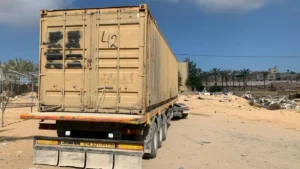Palestinians demand answers after Israel sends truck full of decomposed bodies to Gaza

A truck containing around 90 bodies stands outside Nasser Hospital in southern Gaza, September 2024
Ahmed Aziz in Gaza, Lubna Masarwa in Jerusalem and Katherine Hearst in London report in Middle East Eye on 25 September 2024.
Israel sent a truck filled with the decomposed bodies of nearly 90 Palestinians to Gaza on Wednesday, which the territory’s health ministry refused to bury, citing Israel’s failure to discloses details about who they are and where they were killed.
The Palestinian Ministry of Health, which has worked tirelessly to treat wounded Palestinians and get humanitarian assistance into the enclave, said in a statement that it was refusing to accept the latest arrivals after the Israeli military sent them without providing “their names, ages, genders, or the areas in which they were killed and kidnapped”.
Iyad Qadeeh, a media official at the Ministry of Health, said that Wednesday’s arrival was the fifth time that authorities had received a truck load of unidentified corpses. He told Middle East Eye that from now on health officials would refuse to accept any more bodies without identifying information.
A source at the Nasser Hospital told MEE that the truck driver, who had arrived from Karem Abu Salem checkpoint, was barred from entering the hospital and instructed to “go back to where he came from”.
Since the 7 October attacks, Israeli forces have returned hundreds of bodies to Gaza in a defiled state, many decomposed and unidentifiable.
Israeli forces have repeatedly dug up graves across the enclave to search for the remains of captives taken by Hamas. During the 7 October attack, 1,139 people – mostly civilians – were killed, while more than 250 others were taken as hostages Gaza. Around 100 Israeli captives remain in the enclave.
On 2 August a truck carrying around 90 bodies arrived in Gaza from Israel. The ministry said the remains were returned as “bones and decomposed bodies in an inhumane manner”. The bodies were reportedly so decomposed that the remains of five people were placed in one coffin, and only two families were able to identify the bodies of their children.
Under international humanitarian law, those who have died during an armed conflict must be handled with dignity and be properly managed. The law requires that they be searched for, collected and evacuated, which helps to ensure that people do not go missing.
